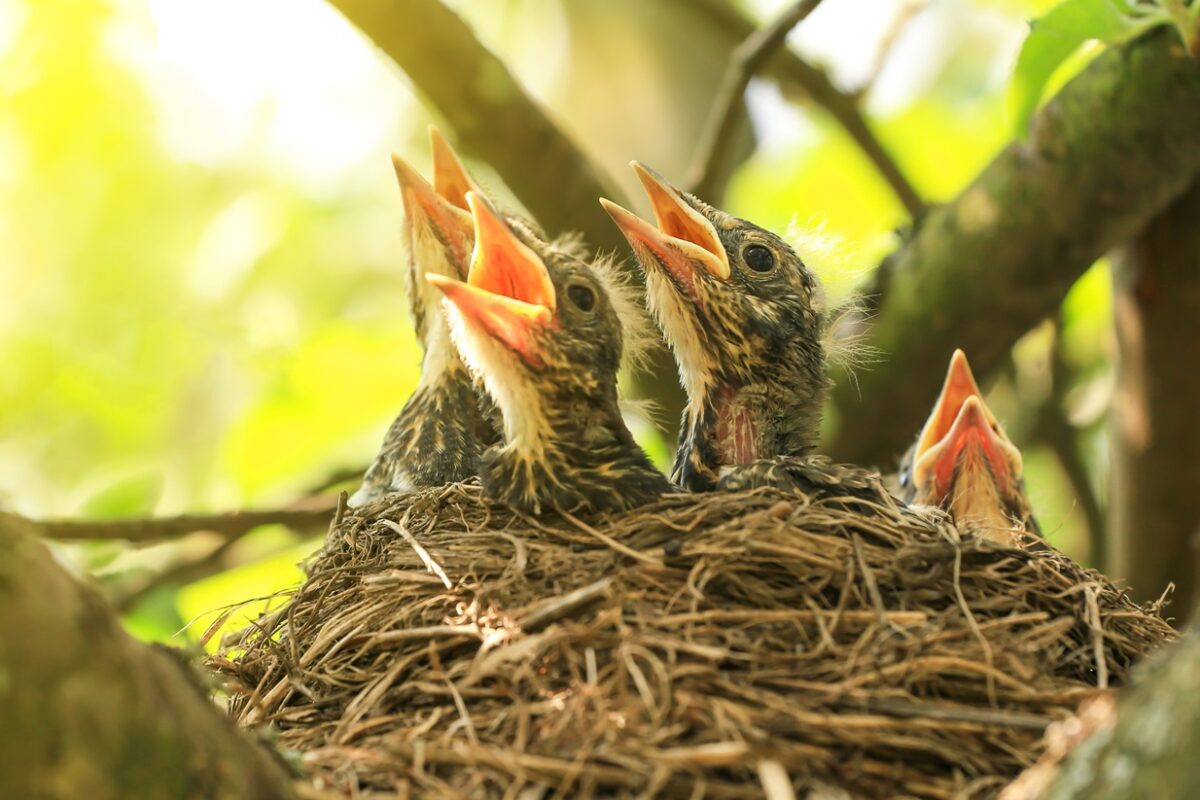If you’re a bird enthusiast, there’s no way you’ve never asked yourself how long baby birds stay in the nest! Maybe there’s even a bird nest somewhere in your yard, and you’re curious about how the parents care for their young!
The truth is, the answer highly depends on the species, whether they are precocial or altricial, and how fast they fledge – meaning how fast their wings become fully developed for flying.
Even though precocial birds may leave the nest to look for food within hours after hatching, they’ll stay close to their parents until they fledge. Altricial birds remain in the nest between 10 days and six months, depending on the species!

How Long Do Baby Birds Stay in the Nest?
The period baby birds remain in the nest to be taken care of depends on the bird type. Some birds are precocial, meaning they require little to no help after hatching, so they may leave the nest within soon after hatching but not for good.
Precocial birds include various species of ducks, geese, waders, and chickens. They hatch with their eyes open and have downy feathers that, over time, are changed to adult feathers. However, since not all can regulate their body temperature yet, these birds remain around their parents for a while even though they can get their own food.
Additionally, it may take some time even for precocial birds to fledge, so even if they can leave the nests (if the nests are on the ground, for example), they may still remain around their parents, which help them forage and explore the surroundings in the meantime. Needless to say, their survival depends on them staying near their parents.
Altricial birds require more time to mature and be ready to leave the nest. Still, the period they remain in the nest depends on each species.
It’s of the essence to mention that the nestling period depends on how many predators are around the nest. If the babies feel threatened, they may be forced to leave the nest sooner.
When Do Different Birds Leave the Nest?
To make things a bit clearer for you, we checked several bird species hoping to understand when their babies leave the nest. We’ve included both precocial and altricial birds, so do not hesitate to keep reading! Wait until you get to baby Andean condors!
Within Hours After Hatching
While ducklings are precocial, this doesn’t mean they are fully independent. Although they can swim as soon as they hatch and may leave the nest, these baby birds will remain near their mothers for warmth, protection, and guidance in terms of habitat and foraging. It also takes a bit of time until they become fledglings.
Two Weeks to a Month
Baby robins, for instance, stay in the nest for approximately two weeks. Once they hatch, they are featherless and have their eyes closed, so the parents should feed and take care of them. Once the babies are two weeks old, they’re capable of flying.
The same goes for baby finches – they typically leave the nest within 12-15 days after hatching.
Baby bluebirds remain in the nest a bit longer than baby finches. Their parents usually care for them for roughly 21 days. However, their parents typically care for their young for a few more weeks. That’s valid for all bluebird species – the Mountain bluebird, the Western bluebird, and the European bluebird.
However, it’s important to mention something extraordinary about the European bluebird. Did you know that baby European bluebirds may remain around the nest once they can take care of themselves to help their parents raise other babies?!
Baby sparrows and baby wrens are altricial as well, most leaving the nest 15-18 days after hatching.
Some baby doves leave the nest a bit earlier, around ten days after hatching. However, like most altricial birds, they remain around the nest afterward and are still fed by their parents. Other dove species, like baby rock doves, develop their flying feathers within 30 days after hatching when they become ready to leave the nest.
The same goes for butcherbirds, especially for pied butcherbirds. These babies spend between 25 and 33 days in the nest before they’re ready to leave. However, if disturbed, baby pied butcherbirds will leave sooner.
More than a Month
Other types of birds, like the black vulture, spend much more time in the nest. These babies are ready to fly off the nest within 75-80 days after hatching.
Bald eagles remain around their parents for a long period as well. When they’re eight weeks old, they can already flap their wings, but still cannot leave the nests.
Some may fledge (develop flying wings) faster, while others take things slower – this process typically happens between 8 and 14 weeks after hatching.
However, even if eaglets leave the nest, they’ll still remain close to it for another six weeks, during which they’re fed and taken care of by their parents.
If you think that’s long, wait until you hear about baby Andean condors! They are ready to fly off their nests only when they’re six months old and remain around their parents until they’re two! This is valid for baby California condors as well.
